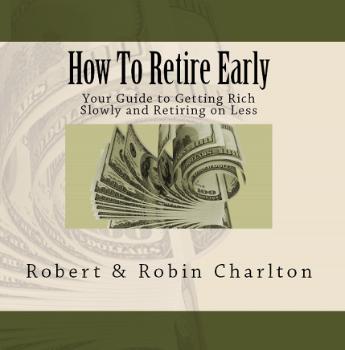

Early Retirement
| Income Taxes in Retirement |
If you’re planning a simple early retirement, you stand a good chance of
paying much lower income taxes than you’ve become accustomed to in your
working years. While your income tax may not always be zero in retirement, it
could quite conceivably be 10% or less. This is good news if you’re thinking of
retiring early on less: not only do you get out of the rat race sooner, you also
get to reduce your income taxes sooner.
Let’s take a look at our own situation as an example. Before retirement, our
average annual income tax as a percentage of gross salary was roughly 25%.
This is based on taking the average of the annual income taxes we paid from
1990 to 2006, including all federal, state, social security, and Medicare taxes.
By comparison, during the eight years since we retired early in 2007, we have
typically paid 0% to 5% in income taxes.
This illustrates how precipitously income taxes can drop once you’re no longer
earning wages. In our final working years we were paying nearly $40,000 per
year in income taxes – which is the same annual amount we're able to live on
in retirement! In 2009 and 2010 we once again paid income taxes due to a six-
month consulting assignment I took on, which just goes to show that salary and
taxes do tend to go hand in hand.
Dividend Income in Retirement
Let’s take a look at one particular year to get a sense of how income taxes
work in retirement, especially with regard to dividends and capital gains. In
2008 we had no income from wages. Instead our income was based solely on
withdrawals from taxable investments: $15,000 from company stock, $15,000
from Vanguard Total International Stock Index Fund, and $10,000 from
Vanguard Total Bond Market Index Fund.
The bond fund generated about $1,200 per month in taxable dividends in
2008, or $14,500 per year. We initially assumed we would take quite a tax hit
from that. However, since our bond income was no longer being added on top
of earned income from a salary, it no longer had the same tax consequences it
would have during our working years.
Instead, this dividend income was more than offset by the IRS’s standard
deductions for a married couple filing jointly (totaling $17,900 in 2008). Thus
the IRS standard deductions can be used as a sort of benchmark: if your
taxable dividends stay at or below this benchmark, then you should owe no
taxes on such income.
Capital Gains in Retirement
In that same year our capital gains totaled $17,196. However, from 2008 to the
most recent tax year (2017), qualified dividends and long-term capital gains
have been taxed at 0% if you fall within the 15% tax bracket or below. For 2017
the 15% tax bracket applied for taxable income between $18,650 and $75,900
for a married couple filing jointly.
It’s important to remember that you never owe taxes on the cost basis of the
money you put into stocks, bonds, and mutual funds. So when we took
$15,000 out of our International Stock fund, for example, we didn’t have
$15,000 in capital gains because about $9,800 of that amount was cost basis
(money we put in). The other $5,200 represented the long-term capital gains
we had realized, and that was the amount we would have owed taxes on -- if
our long-term capital gains tax rate hadn’t been zero.
Part of the reason we sold company stock in 2008 was to take advantage of
the 0% long-term capital gains rate since we knew our company stock had
appreciated more than any other asset we owned. Only about $3,000 of the
$15,000 was cost basis, so we would have owed taxes on $12,000 of capital
gains in a “non-zero” tax year.
With our bond fund, $9,988 of the $10,000 we withdrew was cost basis, so we
only would have owed taxes on about $12 of capital gains. The bond fund had
barely appreciated at all from a capital gains standpoint, although it did
generate plenty of dividends as discussed above.
Bottom Line
If, as an early retiree, your taxable income is moderately low and is generated
primarily through dividends and long-term capital gains, then your taxes are
also likely to be low or nonexistent. Earned income from wages is where you
tend to get hit with the highest taxes. In our own case, since we live frugally but
happily on $40,000 to $45,000 per year, we find taxes have become much less
of a concern. Frugal living, it turns out, has unexpected benefits, and this is
one of them.
paying much lower income taxes than you’ve become accustomed to in your
working years. While your income tax may not always be zero in retirement, it
could quite conceivably be 10% or less. This is good news if you’re thinking of
retiring early on less: not only do you get out of the rat race sooner, you also
get to reduce your income taxes sooner.
Let’s take a look at our own situation as an example. Before retirement, our
average annual income tax as a percentage of gross salary was roughly 25%.
This is based on taking the average of the annual income taxes we paid from
1990 to 2006, including all federal, state, social security, and Medicare taxes.
By comparison, during the eight years since we retired early in 2007, we have
typically paid 0% to 5% in income taxes.
This illustrates how precipitously income taxes can drop once you’re no longer
earning wages. In our final working years we were paying nearly $40,000 per
year in income taxes – which is the same annual amount we're able to live on
in retirement! In 2009 and 2010 we once again paid income taxes due to a six-
month consulting assignment I took on, which just goes to show that salary and
taxes do tend to go hand in hand.
Dividend Income in Retirement
Let’s take a look at one particular year to get a sense of how income taxes
work in retirement, especially with regard to dividends and capital gains. In
2008 we had no income from wages. Instead our income was based solely on
withdrawals from taxable investments: $15,000 from company stock, $15,000
from Vanguard Total International Stock Index Fund, and $10,000 from
Vanguard Total Bond Market Index Fund.
The bond fund generated about $1,200 per month in taxable dividends in
2008, or $14,500 per year. We initially assumed we would take quite a tax hit
from that. However, since our bond income was no longer being added on top
of earned income from a salary, it no longer had the same tax consequences it
would have during our working years.
Instead, this dividend income was more than offset by the IRS’s standard
deductions for a married couple filing jointly (totaling $17,900 in 2008). Thus
the IRS standard deductions can be used as a sort of benchmark: if your
taxable dividends stay at or below this benchmark, then you should owe no
taxes on such income.
Capital Gains in Retirement
In that same year our capital gains totaled $17,196. However, from 2008 to the
most recent tax year (2017), qualified dividends and long-term capital gains
have been taxed at 0% if you fall within the 15% tax bracket or below. For 2017
the 15% tax bracket applied for taxable income between $18,650 and $75,900
for a married couple filing jointly.
It’s important to remember that you never owe taxes on the cost basis of the
money you put into stocks, bonds, and mutual funds. So when we took
$15,000 out of our International Stock fund, for example, we didn’t have
$15,000 in capital gains because about $9,800 of that amount was cost basis
(money we put in). The other $5,200 represented the long-term capital gains
we had realized, and that was the amount we would have owed taxes on -- if
our long-term capital gains tax rate hadn’t been zero.
Part of the reason we sold company stock in 2008 was to take advantage of
the 0% long-term capital gains rate since we knew our company stock had
appreciated more than any other asset we owned. Only about $3,000 of the
$15,000 was cost basis, so we would have owed taxes on $12,000 of capital
gains in a “non-zero” tax year.
With our bond fund, $9,988 of the $10,000 we withdrew was cost basis, so we
only would have owed taxes on about $12 of capital gains. The bond fund had
barely appreciated at all from a capital gains standpoint, although it did
generate plenty of dividends as discussed above.
Bottom Line
If, as an early retiree, your taxable income is moderately low and is generated
primarily through dividends and long-term capital gains, then your taxes are
also likely to be low or nonexistent. Earned income from wages is where you
tend to get hit with the highest taxes. In our own case, since we live frugally but
happily on $40,000 to $45,000 per year, we find taxes have become much less
of a concern. Frugal living, it turns out, has unexpected benefits, and this is
one of them.
